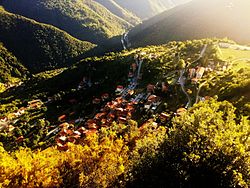Retignano
|
Retignano Retinius |
|
|---|---|
| Frazione | |

The village in summer 2015
|
|
| Location of Retignano in Italy | |
| Coordinates: 44°0′18″N 10°16′23″E / 44.00500°N 10.27306°ECoordinates: 44°0′18″N 10°16′23″E / 44.00500°N 10.27306°E | |
| Country |
|
| Region | Tuscany |
| Province | Lucca (LU) |
| Comune | Stazzema |
| Elevation | 430 m (1,410 ft) |
| Population (2014) | |
| • Total | 381 |
| Demonym(s) | Retignanesi |
| Time zone | CET (UTC+1) |
| • Summer (DST) | CEST (UTC+2) |
| Postal code | 55040 |
| Dialing code | 0584 |
| Patron saint | St. Peter |
| Saint day | June 29 |
| Website | Official website |
Retignano is a village of about 400 inhabitants, located on a hill in the historical Versilia, a northern area of the Italian region of Tuscany, in the municipality of Stazzema, about 430 meters above sea level. The inhabitants are called Retignanesi.
In the first centuries AD, because of the raids made by barbarian peoples, several forts were built in the current area of Retignano, many of which are still visible, although not easily accessible. The fort called "Pineta" still has loopholes and is open to the public, while others (especially those of the "roso" and the "casino") have been converted into marginette (small huts with a religious engraving or image, used to rest for a while and/or to pray) or metati, that is chestnut processing houses to get flour and other types of food.
The origins of the village date back to the twenty years between 560 and 580 AD, in the late Roman age, in which the militias of Rome fought against the Ligurian Apuans, a population of the Apuan Alps. It is believed, in fact, that even then there was a small group of huts surrounded by many fields, some of which were shared with other nearby settlements of Terrinca and Levigliani, where they have found traces of this population. Furthermore, Retignano shared with Levigliani a sort of necropolis, digged in the mountains.
For many centuries the Ligurian Apuans had to battle against the Romans to keep their possessions in Versilia. Most of the times they suffered heavy defeats because they were not so "on the edge" in weapons. However, historians believe that not all of them were deported in southern Italy during the period from 177 to 155 BC, probably because Rome was more interested in restraining these nomads away from the coast and the valley of Magra river, since they were a property of the Romans and the Apuans were just deemed as a threat to safety of the port of Luni and its trading importance. For this reason, in 560 AD, some of the Ligurian Apuans still lived in Versilia and founded tiny villages still nowadays inhabited or still visible.
The Ligurian-Apuans, or simply Apuans, were a population divided into various tribes, called Nomens (names) by Roman historians; one of them settled between the mountains of Mont'Alto, a very large area, surrounded by natural boundaries (such as woods and streams) and full of resources, including medicinal plants and wildlife. Here the Apuan lived a semi-nomadic life and exploiting the area of Retignano as a settlement from spring until early winter. In more sheltered areas and clearings like "Gordici" and "Valimoni", places of Retignano located in the woods, about 700 meters above the sea level, there were the remais of smaller settlements called by the Apuans luki (turned in Latin into loci, plural of locus which stands for "place"). In case of war, they always had a safe-conduct to a fortified summit from which they could see the horizon, being able to warn in time their compatriots of the arrival of the enemy. For Retignano, this summit coincides with the top of the mountain Castello ("castle"), whose etimology probably is to relate with this habit. From there you can see the entire valley and the coast of Versilia; on clear days, even a glimpse of the Tuscan archipelago can be caught. The gaps left by Roman historiography do not allow us to identify the tribes that populated Retignano. It is believed that they were the Vasates, inhabitants of Basati, a place in front of Retignano.
...
Wikipedia

